An Analysis of Florence Nightingale's Life Span and Contributions
VerifiedAdded on 2022/11/07
|11
|3033
|475
Essay
AI Summary
This essay delves into the life and contributions of Florence Nightingale, the founder of modern nursing, examining her through the framework of Erikson's theory of Eight Stages of Development. It explores her upbringing in a wealthy Victorian family, her conflicts with societal expectations and her parents' wishes, and her determination to pursue nursing despite the opposition. The essay analyzes her actions and decisions, such as her work during the Crimean War, her reforms in sanitation, and her establishment of a nursing school. It applies Erikson's stages, including trust vs. mistrust, autonomy vs. shame, initiative vs. guilt, and industry vs. inferiority, to understand her psychological and social development, highlighting her strong will, sense of purpose, and impact on the nursing profession and healthcare standards. The essay also discusses the cultural context of her time, including Victorian values and the expectations placed on women, providing a comprehensive analysis of Nightingale's life and legacy.
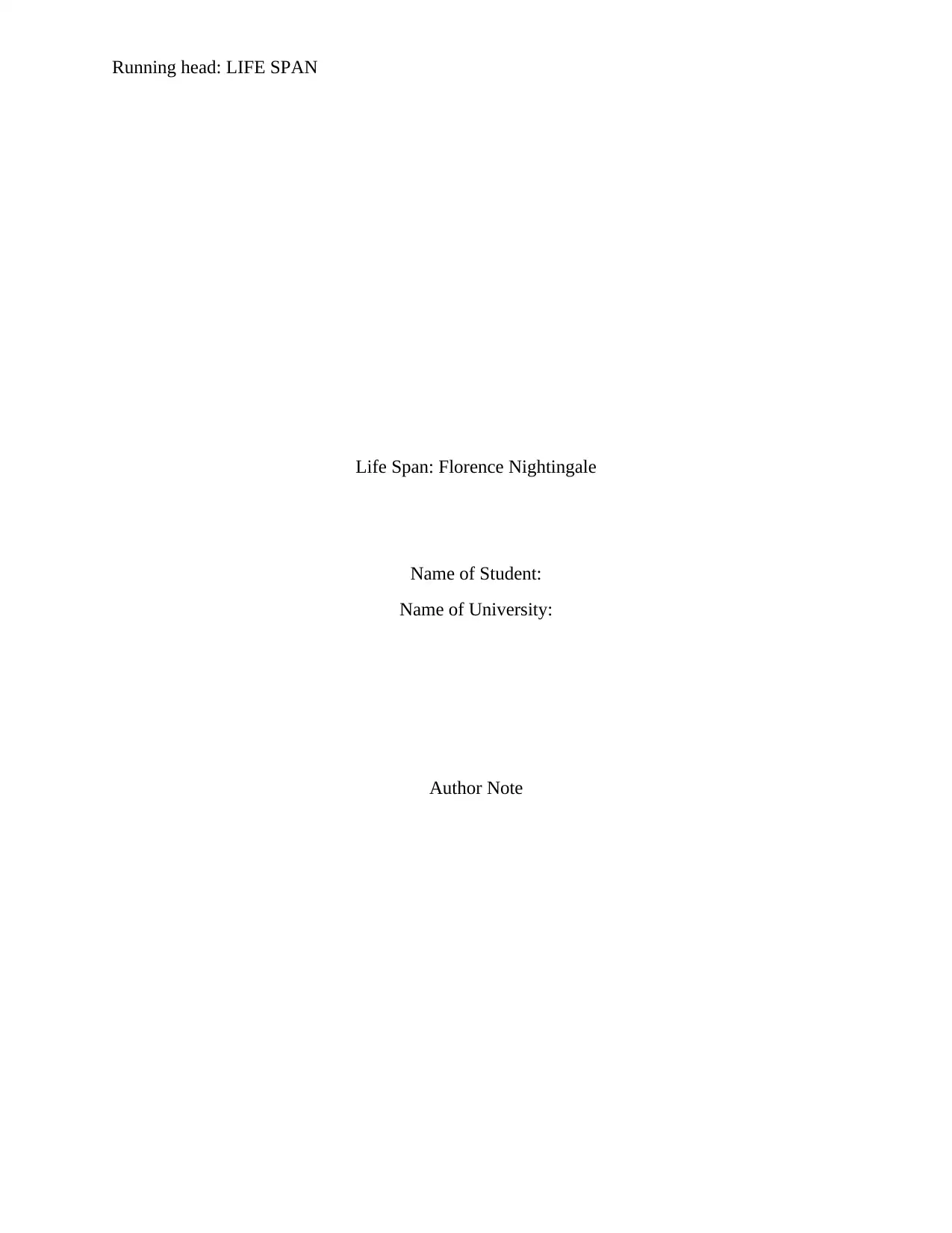
Running head: LIFE SPAN
Life Span: Florence Nightingale
Name of Student:
Name of University:
Author Note
Life Span: Florence Nightingale
Name of Student:
Name of University:
Author Note
Paraphrase This Document
Need a fresh take? Get an instant paraphrase of this document with our AI Paraphraser
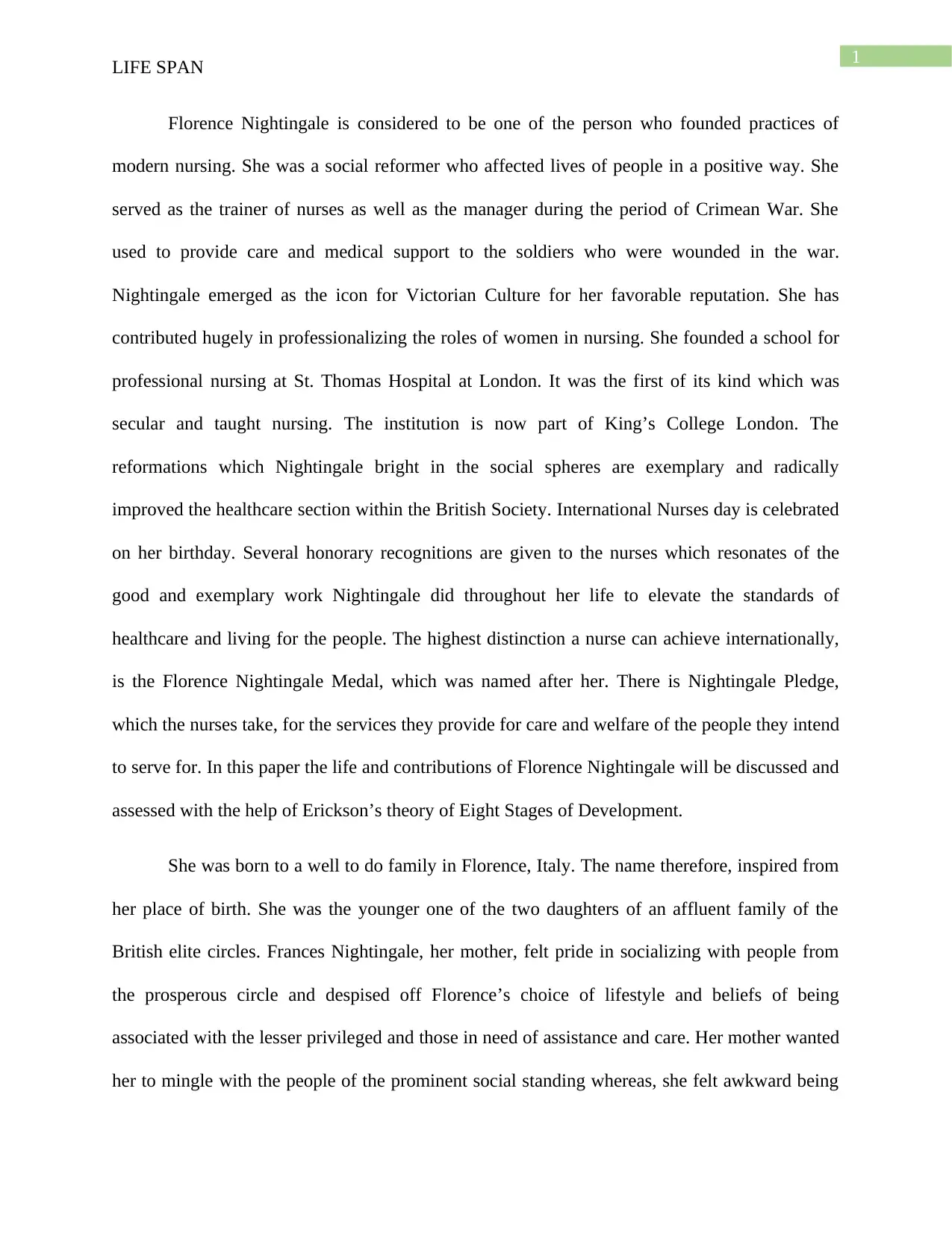
1
LIFE SPAN
Florence Nightingale is considered to be one of the person who founded practices of
modern nursing. She was a social reformer who affected lives of people in a positive way. She
served as the trainer of nurses as well as the manager during the period of Crimean War. She
used to provide care and medical support to the soldiers who were wounded in the war.
Nightingale emerged as the icon for Victorian Culture for her favorable reputation. She has
contributed hugely in professionalizing the roles of women in nursing. She founded a school for
professional nursing at St. Thomas Hospital at London. It was the first of its kind which was
secular and taught nursing. The institution is now part of King’s College London. The
reformations which Nightingale bright in the social spheres are exemplary and radically
improved the healthcare section within the British Society. International Nurses day is celebrated
on her birthday. Several honorary recognitions are given to the nurses which resonates of the
good and exemplary work Nightingale did throughout her life to elevate the standards of
healthcare and living for the people. The highest distinction a nurse can achieve internationally,
is the Florence Nightingale Medal, which was named after her. There is Nightingale Pledge,
which the nurses take, for the services they provide for care and welfare of the people they intend
to serve for. In this paper the life and contributions of Florence Nightingale will be discussed and
assessed with the help of Erickson’s theory of Eight Stages of Development.
She was born to a well to do family in Florence, Italy. The name therefore, inspired from
her place of birth. She was the younger one of the two daughters of an affluent family of the
British elite circles. Frances Nightingale, her mother, felt pride in socializing with people from
the prosperous circle and despised off Florence’s choice of lifestyle and beliefs of being
associated with the lesser privileged and those in need of assistance and care. Her mother wanted
her to mingle with the people of the prominent social standing whereas, she felt awkward being
LIFE SPAN
Florence Nightingale is considered to be one of the person who founded practices of
modern nursing. She was a social reformer who affected lives of people in a positive way. She
served as the trainer of nurses as well as the manager during the period of Crimean War. She
used to provide care and medical support to the soldiers who were wounded in the war.
Nightingale emerged as the icon for Victorian Culture for her favorable reputation. She has
contributed hugely in professionalizing the roles of women in nursing. She founded a school for
professional nursing at St. Thomas Hospital at London. It was the first of its kind which was
secular and taught nursing. The institution is now part of King’s College London. The
reformations which Nightingale bright in the social spheres are exemplary and radically
improved the healthcare section within the British Society. International Nurses day is celebrated
on her birthday. Several honorary recognitions are given to the nurses which resonates of the
good and exemplary work Nightingale did throughout her life to elevate the standards of
healthcare and living for the people. The highest distinction a nurse can achieve internationally,
is the Florence Nightingale Medal, which was named after her. There is Nightingale Pledge,
which the nurses take, for the services they provide for care and welfare of the people they intend
to serve for. In this paper the life and contributions of Florence Nightingale will be discussed and
assessed with the help of Erickson’s theory of Eight Stages of Development.
She was born to a well to do family in Florence, Italy. The name therefore, inspired from
her place of birth. She was the younger one of the two daughters of an affluent family of the
British elite circles. Frances Nightingale, her mother, felt pride in socializing with people from
the prosperous circle and despised off Florence’s choice of lifestyle and beliefs of being
associated with the lesser privileged and those in need of assistance and care. Her mother wanted
her to mingle with the people of the prominent social standing whereas, she felt awkward being
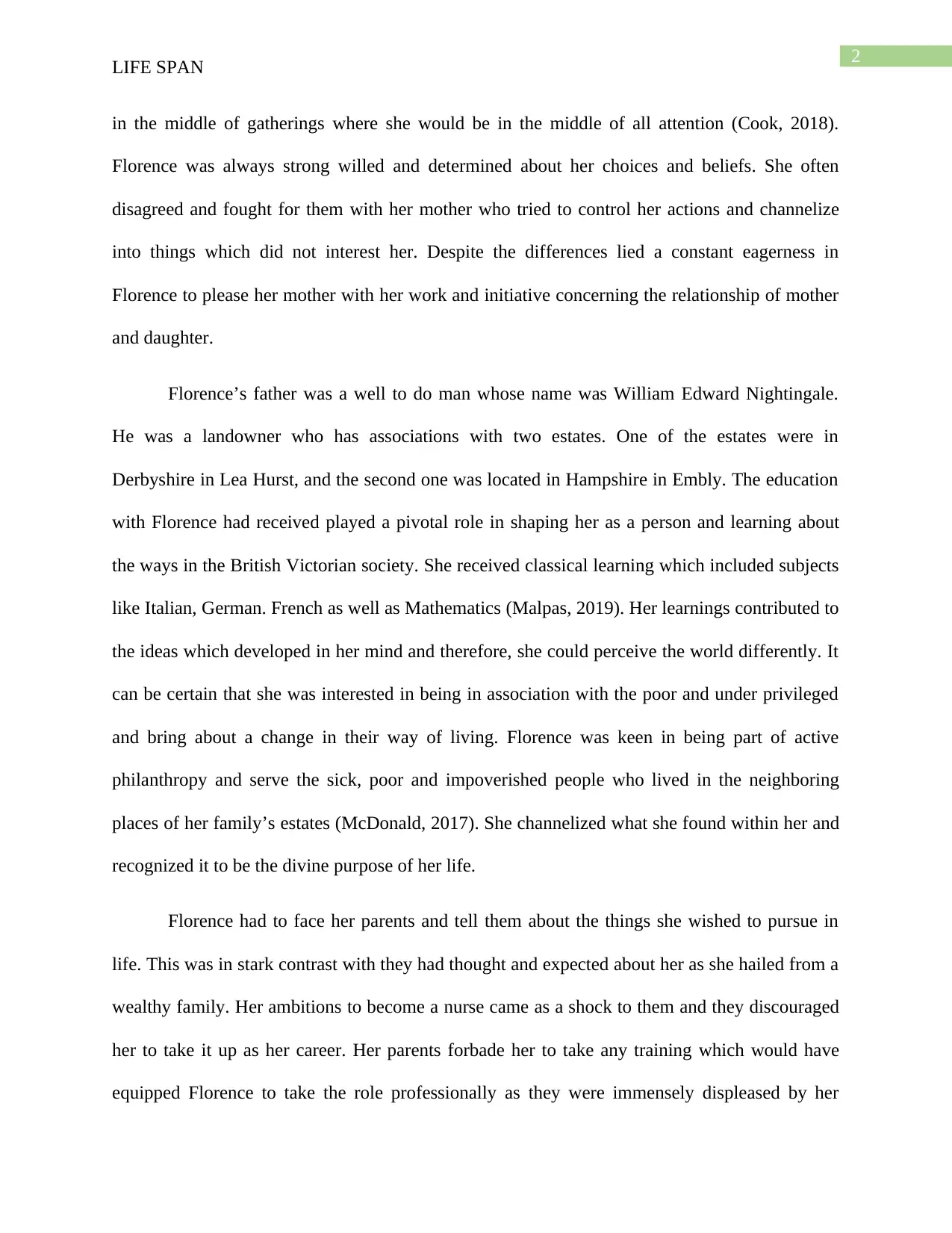
2
LIFE SPAN
in the middle of gatherings where she would be in the middle of all attention (Cook, 2018).
Florence was always strong willed and determined about her choices and beliefs. She often
disagreed and fought for them with her mother who tried to control her actions and channelize
into things which did not interest her. Despite the differences lied a constant eagerness in
Florence to please her mother with her work and initiative concerning the relationship of mother
and daughter.
Florence’s father was a well to do man whose name was William Edward Nightingale.
He was a landowner who has associations with two estates. One of the estates were in
Derbyshire in Lea Hurst, and the second one was located in Hampshire in Embly. The education
with Florence had received played a pivotal role in shaping her as a person and learning about
the ways in the British Victorian society. She received classical learning which included subjects
like Italian, German. French as well as Mathematics (Malpas, 2019). Her learnings contributed to
the ideas which developed in her mind and therefore, she could perceive the world differently. It
can be certain that she was interested in being in association with the poor and under privileged
and bring about a change in their way of living. Florence was keen in being part of active
philanthropy and serve the sick, poor and impoverished people who lived in the neighboring
places of her family’s estates (McDonald, 2017). She channelized what she found within her and
recognized it to be the divine purpose of her life.
Florence had to face her parents and tell them about the things she wished to pursue in
life. This was in stark contrast with they had thought and expected about her as she hailed from a
wealthy family. Her ambitions to become a nurse came as a shock to them and they discouraged
her to take it up as her career. Her parents forbade her to take any training which would have
equipped Florence to take the role professionally as they were immensely displeased by her
LIFE SPAN
in the middle of gatherings where she would be in the middle of all attention (Cook, 2018).
Florence was always strong willed and determined about her choices and beliefs. She often
disagreed and fought for them with her mother who tried to control her actions and channelize
into things which did not interest her. Despite the differences lied a constant eagerness in
Florence to please her mother with her work and initiative concerning the relationship of mother
and daughter.
Florence’s father was a well to do man whose name was William Edward Nightingale.
He was a landowner who has associations with two estates. One of the estates were in
Derbyshire in Lea Hurst, and the second one was located in Hampshire in Embly. The education
with Florence had received played a pivotal role in shaping her as a person and learning about
the ways in the British Victorian society. She received classical learning which included subjects
like Italian, German. French as well as Mathematics (Malpas, 2019). Her learnings contributed to
the ideas which developed in her mind and therefore, she could perceive the world differently. It
can be certain that she was interested in being in association with the poor and under privileged
and bring about a change in their way of living. Florence was keen in being part of active
philanthropy and serve the sick, poor and impoverished people who lived in the neighboring
places of her family’s estates (McDonald, 2017). She channelized what she found within her and
recognized it to be the divine purpose of her life.
Florence had to face her parents and tell them about the things she wished to pursue in
life. This was in stark contrast with they had thought and expected about her as she hailed from a
wealthy family. Her ambitions to become a nurse came as a shock to them and they discouraged
her to take it up as her career. Her parents forbade her to take any training which would have
equipped Florence to take the role professionally as they were immensely displeased by her
⊘ This is a preview!⊘
Do you want full access?
Subscribe today to unlock all pages.

Trusted by 1+ million students worldwide
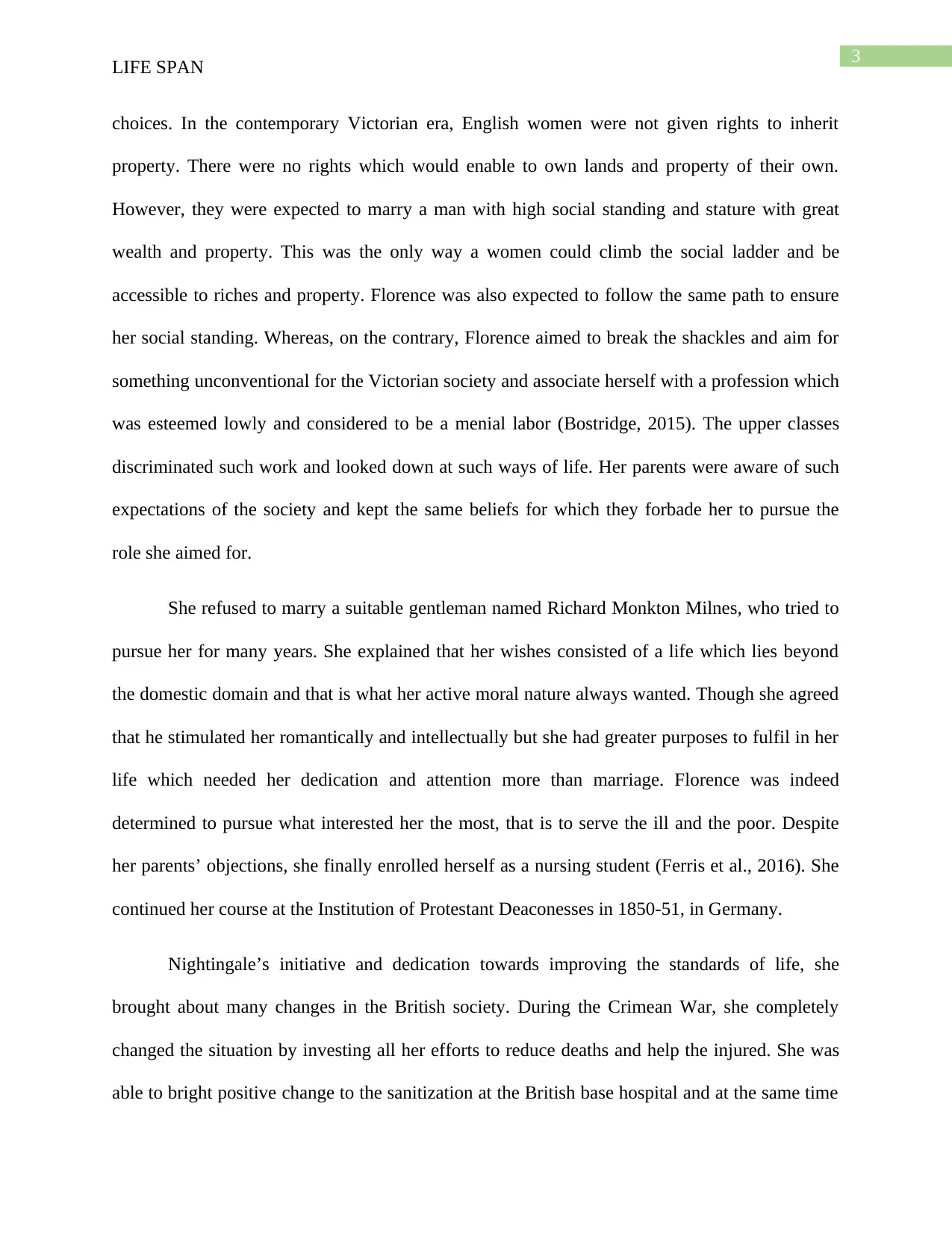
3
LIFE SPAN
choices. In the contemporary Victorian era, English women were not given rights to inherit
property. There were no rights which would enable to own lands and property of their own.
However, they were expected to marry a man with high social standing and stature with great
wealth and property. This was the only way a women could climb the social ladder and be
accessible to riches and property. Florence was also expected to follow the same path to ensure
her social standing. Whereas, on the contrary, Florence aimed to break the shackles and aim for
something unconventional for the Victorian society and associate herself with a profession which
was esteemed lowly and considered to be a menial labor (Bostridge, 2015). The upper classes
discriminated such work and looked down at such ways of life. Her parents were aware of such
expectations of the society and kept the same beliefs for which they forbade her to pursue the
role she aimed for.
She refused to marry a suitable gentleman named Richard Monkton Milnes, who tried to
pursue her for many years. She explained that her wishes consisted of a life which lies beyond
the domestic domain and that is what her active moral nature always wanted. Though she agreed
that he stimulated her romantically and intellectually but she had greater purposes to fulfil in her
life which needed her dedication and attention more than marriage. Florence was indeed
determined to pursue what interested her the most, that is to serve the ill and the poor. Despite
her parents’ objections, she finally enrolled herself as a nursing student (Ferris et al., 2016). She
continued her course at the Institution of Protestant Deaconesses in 1850-51, in Germany.
Nightingale’s initiative and dedication towards improving the standards of life, she
brought about many changes in the British society. During the Crimean War, she completely
changed the situation by investing all her efforts to reduce deaths and help the injured. She was
able to bright positive change to the sanitization at the British base hospital and at the same time
LIFE SPAN
choices. In the contemporary Victorian era, English women were not given rights to inherit
property. There were no rights which would enable to own lands and property of their own.
However, they were expected to marry a man with high social standing and stature with great
wealth and property. This was the only way a women could climb the social ladder and be
accessible to riches and property. Florence was also expected to follow the same path to ensure
her social standing. Whereas, on the contrary, Florence aimed to break the shackles and aim for
something unconventional for the Victorian society and associate herself with a profession which
was esteemed lowly and considered to be a menial labor (Bostridge, 2015). The upper classes
discriminated such work and looked down at such ways of life. Her parents were aware of such
expectations of the society and kept the same beliefs for which they forbade her to pursue the
role she aimed for.
She refused to marry a suitable gentleman named Richard Monkton Milnes, who tried to
pursue her for many years. She explained that her wishes consisted of a life which lies beyond
the domestic domain and that is what her active moral nature always wanted. Though she agreed
that he stimulated her romantically and intellectually but she had greater purposes to fulfil in her
life which needed her dedication and attention more than marriage. Florence was indeed
determined to pursue what interested her the most, that is to serve the ill and the poor. Despite
her parents’ objections, she finally enrolled herself as a nursing student (Ferris et al., 2016). She
continued her course at the Institution of Protestant Deaconesses in 1850-51, in Germany.
Nightingale’s initiative and dedication towards improving the standards of life, she
brought about many changes in the British society. During the Crimean War, she completely
changed the situation by investing all her efforts to reduce deaths and help the injured. She was
able to bright positive change to the sanitization at the British base hospital and at the same time
Paraphrase This Document
Need a fresh take? Get an instant paraphrase of this document with our AI Paraphraser
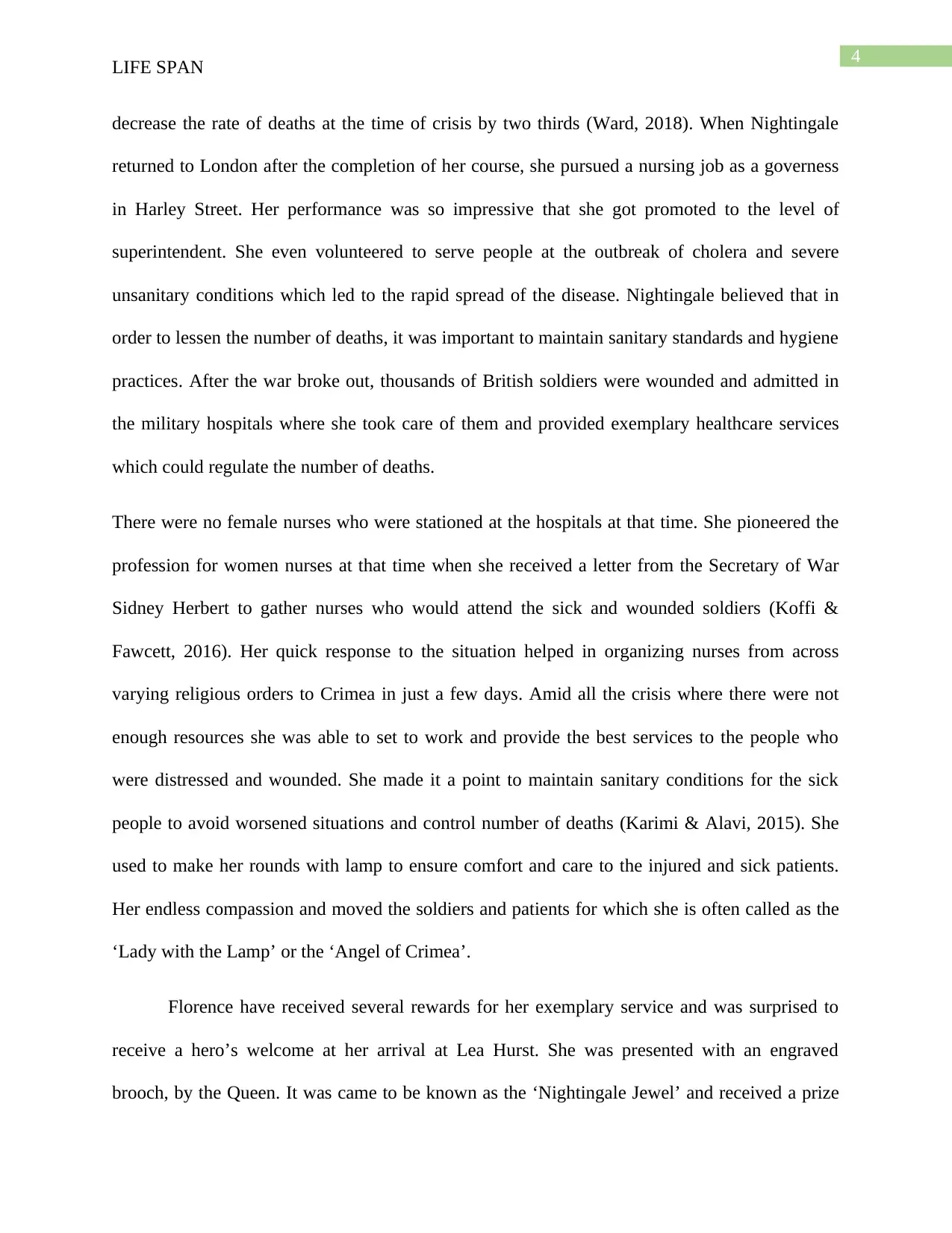
4
LIFE SPAN
decrease the rate of deaths at the time of crisis by two thirds (Ward, 2018). When Nightingale
returned to London after the completion of her course, she pursued a nursing job as a governess
in Harley Street. Her performance was so impressive that she got promoted to the level of
superintendent. She even volunteered to serve people at the outbreak of cholera and severe
unsanitary conditions which led to the rapid spread of the disease. Nightingale believed that in
order to lessen the number of deaths, it was important to maintain sanitary standards and hygiene
practices. After the war broke out, thousands of British soldiers were wounded and admitted in
the military hospitals where she took care of them and provided exemplary healthcare services
which could regulate the number of deaths.
There were no female nurses who were stationed at the hospitals at that time. She pioneered the
profession for women nurses at that time when she received a letter from the Secretary of War
Sidney Herbert to gather nurses who would attend the sick and wounded soldiers (Koffi &
Fawcett, 2016). Her quick response to the situation helped in organizing nurses from across
varying religious orders to Crimea in just a few days. Amid all the crisis where there were not
enough resources she was able to set to work and provide the best services to the people who
were distressed and wounded. She made it a point to maintain sanitary conditions for the sick
people to avoid worsened situations and control number of deaths (Karimi & Alavi, 2015). She
used to make her rounds with lamp to ensure comfort and care to the injured and sick patients.
Her endless compassion and moved the soldiers and patients for which she is often called as the
‘Lady with the Lamp’ or the ‘Angel of Crimea’.
Florence have received several rewards for her exemplary service and was surprised to
receive a hero’s welcome at her arrival at Lea Hurst. She was presented with an engraved
brooch, by the Queen. It was came to be known as the ‘Nightingale Jewel’ and received a prize
LIFE SPAN
decrease the rate of deaths at the time of crisis by two thirds (Ward, 2018). When Nightingale
returned to London after the completion of her course, she pursued a nursing job as a governess
in Harley Street. Her performance was so impressive that she got promoted to the level of
superintendent. She even volunteered to serve people at the outbreak of cholera and severe
unsanitary conditions which led to the rapid spread of the disease. Nightingale believed that in
order to lessen the number of deaths, it was important to maintain sanitary standards and hygiene
practices. After the war broke out, thousands of British soldiers were wounded and admitted in
the military hospitals where she took care of them and provided exemplary healthcare services
which could regulate the number of deaths.
There were no female nurses who were stationed at the hospitals at that time. She pioneered the
profession for women nurses at that time when she received a letter from the Secretary of War
Sidney Herbert to gather nurses who would attend the sick and wounded soldiers (Koffi &
Fawcett, 2016). Her quick response to the situation helped in organizing nurses from across
varying religious orders to Crimea in just a few days. Amid all the crisis where there were not
enough resources she was able to set to work and provide the best services to the people who
were distressed and wounded. She made it a point to maintain sanitary conditions for the sick
people to avoid worsened situations and control number of deaths (Karimi & Alavi, 2015). She
used to make her rounds with lamp to ensure comfort and care to the injured and sick patients.
Her endless compassion and moved the soldiers and patients for which she is often called as the
‘Lady with the Lamp’ or the ‘Angel of Crimea’.
Florence have received several rewards for her exemplary service and was surprised to
receive a hero’s welcome at her arrival at Lea Hurst. She was presented with an engraved
brooch, by the Queen. It was came to be known as the ‘Nightingale Jewel’ and received a prize
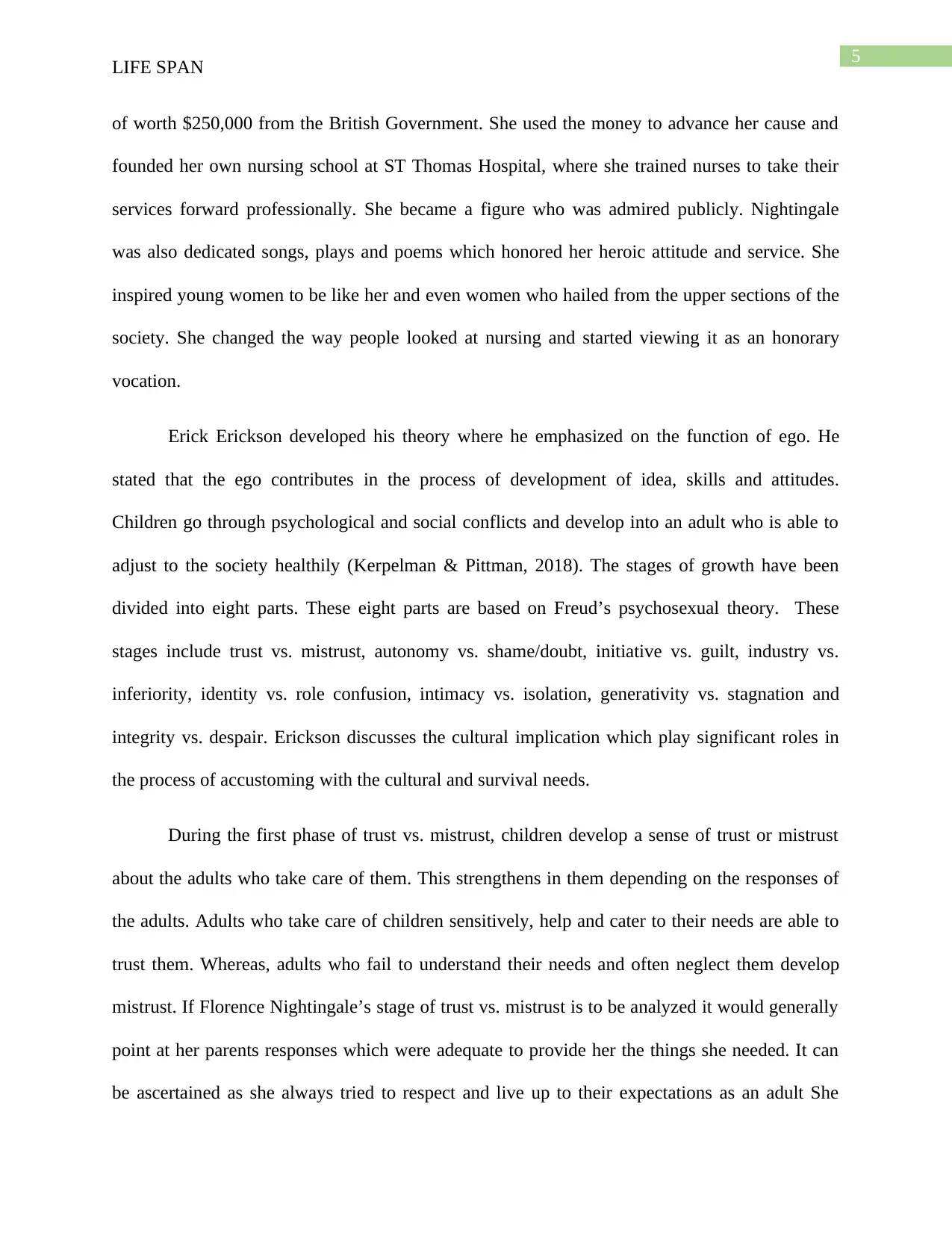
5
LIFE SPAN
of worth $250,000 from the British Government. She used the money to advance her cause and
founded her own nursing school at ST Thomas Hospital, where she trained nurses to take their
services forward professionally. She became a figure who was admired publicly. Nightingale
was also dedicated songs, plays and poems which honored her heroic attitude and service. She
inspired young women to be like her and even women who hailed from the upper sections of the
society. She changed the way people looked at nursing and started viewing it as an honorary
vocation.
Erick Erickson developed his theory where he emphasized on the function of ego. He
stated that the ego contributes in the process of development of idea, skills and attitudes.
Children go through psychological and social conflicts and develop into an adult who is able to
adjust to the society healthily (Kerpelman & Pittman, 2018). The stages of growth have been
divided into eight parts. These eight parts are based on Freud’s psychosexual theory. These
stages include trust vs. mistrust, autonomy vs. shame/doubt, initiative vs. guilt, industry vs.
inferiority, identity vs. role confusion, intimacy vs. isolation, generativity vs. stagnation and
integrity vs. despair. Erickson discusses the cultural implication which play significant roles in
the process of accustoming with the cultural and survival needs.
During the first phase of trust vs. mistrust, children develop a sense of trust or mistrust
about the adults who take care of them. This strengthens in them depending on the responses of
the adults. Adults who take care of children sensitively, help and cater to their needs are able to
trust them. Whereas, adults who fail to understand their needs and often neglect them develop
mistrust. If Florence Nightingale’s stage of trust vs. mistrust is to be analyzed it would generally
point at her parents responses which were adequate to provide her the things she needed. It can
be ascertained as she always tried to respect and live up to their expectations as an adult She
LIFE SPAN
of worth $250,000 from the British Government. She used the money to advance her cause and
founded her own nursing school at ST Thomas Hospital, where she trained nurses to take their
services forward professionally. She became a figure who was admired publicly. Nightingale
was also dedicated songs, plays and poems which honored her heroic attitude and service. She
inspired young women to be like her and even women who hailed from the upper sections of the
society. She changed the way people looked at nursing and started viewing it as an honorary
vocation.
Erick Erickson developed his theory where he emphasized on the function of ego. He
stated that the ego contributes in the process of development of idea, skills and attitudes.
Children go through psychological and social conflicts and develop into an adult who is able to
adjust to the society healthily (Kerpelman & Pittman, 2018). The stages of growth have been
divided into eight parts. These eight parts are based on Freud’s psychosexual theory. These
stages include trust vs. mistrust, autonomy vs. shame/doubt, initiative vs. guilt, industry vs.
inferiority, identity vs. role confusion, intimacy vs. isolation, generativity vs. stagnation and
integrity vs. despair. Erickson discusses the cultural implication which play significant roles in
the process of accustoming with the cultural and survival needs.
During the first phase of trust vs. mistrust, children develop a sense of trust or mistrust
about the adults who take care of them. This strengthens in them depending on the responses of
the adults. Adults who take care of children sensitively, help and cater to their needs are able to
trust them. Whereas, adults who fail to understand their needs and often neglect them develop
mistrust. If Florence Nightingale’s stage of trust vs. mistrust is to be analyzed it would generally
point at her parents responses which were adequate to provide her the things she needed. It can
be ascertained as she always tried to respect and live up to their expectations as an adult She
⊘ This is a preview!⊘
Do you want full access?
Subscribe today to unlock all pages.

Trusted by 1+ million students worldwide
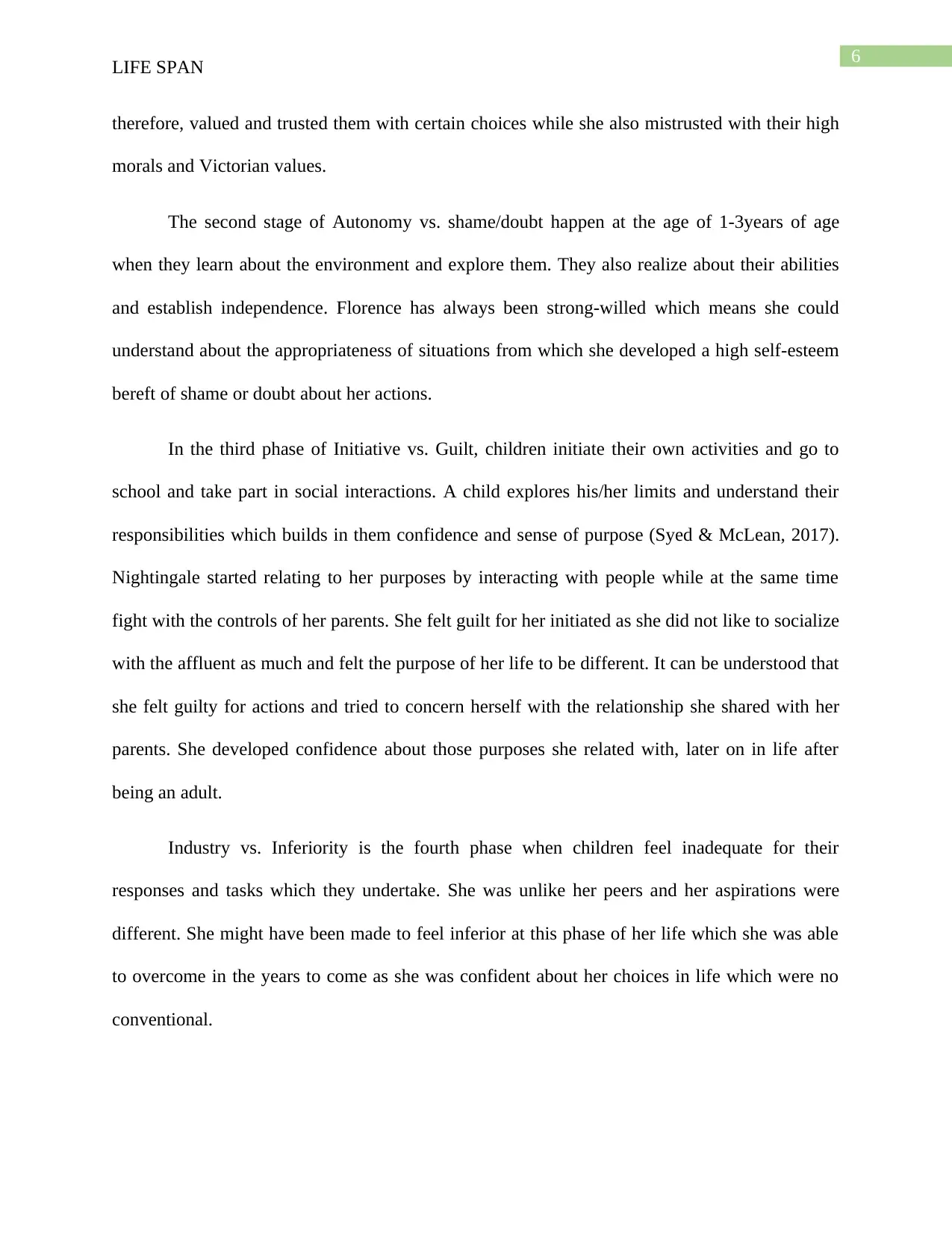
6
LIFE SPAN
therefore, valued and trusted them with certain choices while she also mistrusted with their high
morals and Victorian values.
The second stage of Autonomy vs. shame/doubt happen at the age of 1-3years of age
when they learn about the environment and explore them. They also realize about their abilities
and establish independence. Florence has always been strong-willed which means she could
understand about the appropriateness of situations from which she developed a high self-esteem
bereft of shame or doubt about her actions.
In the third phase of Initiative vs. Guilt, children initiate their own activities and go to
school and take part in social interactions. A child explores his/her limits and understand their
responsibilities which builds in them confidence and sense of purpose (Syed & McLean, 2017).
Nightingale started relating to her purposes by interacting with people while at the same time
fight with the controls of her parents. She felt guilt for her initiated as she did not like to socialize
with the affluent as much and felt the purpose of her life to be different. It can be understood that
she felt guilty for actions and tried to concern herself with the relationship she shared with her
parents. She developed confidence about those purposes she related with, later on in life after
being an adult.
Industry vs. Inferiority is the fourth phase when children feel inadequate for their
responses and tasks which they undertake. She was unlike her peers and her aspirations were
different. She might have been made to feel inferior at this phase of her life which she was able
to overcome in the years to come as she was confident about her choices in life which were no
conventional.
LIFE SPAN
therefore, valued and trusted them with certain choices while she also mistrusted with their high
morals and Victorian values.
The second stage of Autonomy vs. shame/doubt happen at the age of 1-3years of age
when they learn about the environment and explore them. They also realize about their abilities
and establish independence. Florence has always been strong-willed which means she could
understand about the appropriateness of situations from which she developed a high self-esteem
bereft of shame or doubt about her actions.
In the third phase of Initiative vs. Guilt, children initiate their own activities and go to
school and take part in social interactions. A child explores his/her limits and understand their
responsibilities which builds in them confidence and sense of purpose (Syed & McLean, 2017).
Nightingale started relating to her purposes by interacting with people while at the same time
fight with the controls of her parents. She felt guilt for her initiated as she did not like to socialize
with the affluent as much and felt the purpose of her life to be different. It can be understood that
she felt guilty for actions and tried to concern herself with the relationship she shared with her
parents. She developed confidence about those purposes she related with, later on in life after
being an adult.
Industry vs. Inferiority is the fourth phase when children feel inadequate for their
responses and tasks which they undertake. She was unlike her peers and her aspirations were
different. She might have been made to feel inferior at this phase of her life which she was able
to overcome in the years to come as she was confident about her choices in life which were no
conventional.
Paraphrase This Document
Need a fresh take? Get an instant paraphrase of this document with our AI Paraphraser
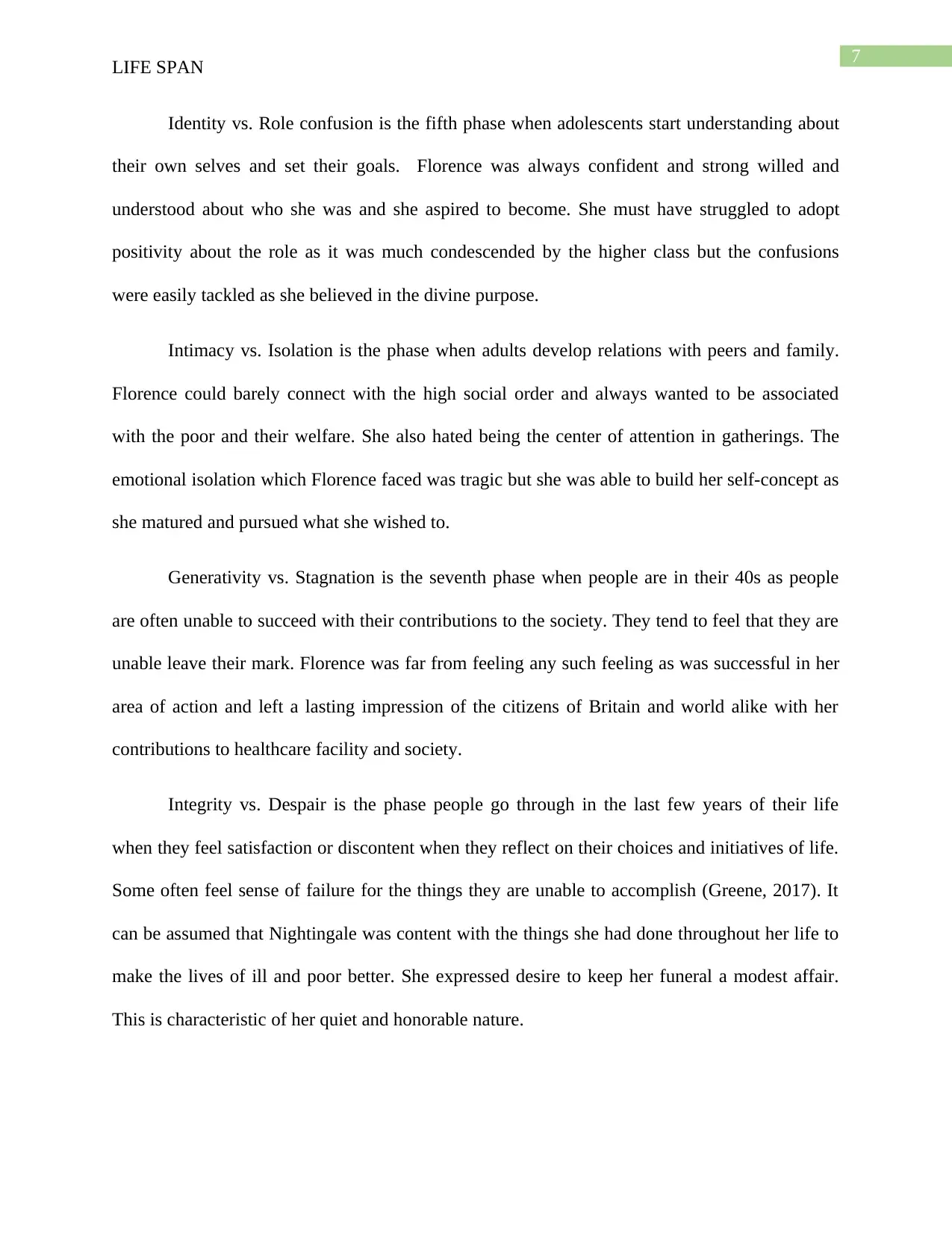
7
LIFE SPAN
Identity vs. Role confusion is the fifth phase when adolescents start understanding about
their own selves and set their goals. Florence was always confident and strong willed and
understood about who she was and she aspired to become. She must have struggled to adopt
positivity about the role as it was much condescended by the higher class but the confusions
were easily tackled as she believed in the divine purpose.
Intimacy vs. Isolation is the phase when adults develop relations with peers and family.
Florence could barely connect with the high social order and always wanted to be associated
with the poor and their welfare. She also hated being the center of attention in gatherings. The
emotional isolation which Florence faced was tragic but she was able to build her self-concept as
she matured and pursued what she wished to.
Generativity vs. Stagnation is the seventh phase when people are in their 40s as people
are often unable to succeed with their contributions to the society. They tend to feel that they are
unable leave their mark. Florence was far from feeling any such feeling as was successful in her
area of action and left a lasting impression of the citizens of Britain and world alike with her
contributions to healthcare facility and society.
Integrity vs. Despair is the phase people go through in the last few years of their life
when they feel satisfaction or discontent when they reflect on their choices and initiatives of life.
Some often feel sense of failure for the things they are unable to accomplish (Greene, 2017). It
can be assumed that Nightingale was content with the things she had done throughout her life to
make the lives of ill and poor better. She expressed desire to keep her funeral a modest affair.
This is characteristic of her quiet and honorable nature.
LIFE SPAN
Identity vs. Role confusion is the fifth phase when adolescents start understanding about
their own selves and set their goals. Florence was always confident and strong willed and
understood about who she was and she aspired to become. She must have struggled to adopt
positivity about the role as it was much condescended by the higher class but the confusions
were easily tackled as she believed in the divine purpose.
Intimacy vs. Isolation is the phase when adults develop relations with peers and family.
Florence could barely connect with the high social order and always wanted to be associated
with the poor and their welfare. She also hated being the center of attention in gatherings. The
emotional isolation which Florence faced was tragic but she was able to build her self-concept as
she matured and pursued what she wished to.
Generativity vs. Stagnation is the seventh phase when people are in their 40s as people
are often unable to succeed with their contributions to the society. They tend to feel that they are
unable leave their mark. Florence was far from feeling any such feeling as was successful in her
area of action and left a lasting impression of the citizens of Britain and world alike with her
contributions to healthcare facility and society.
Integrity vs. Despair is the phase people go through in the last few years of their life
when they feel satisfaction or discontent when they reflect on their choices and initiatives of life.
Some often feel sense of failure for the things they are unable to accomplish (Greene, 2017). It
can be assumed that Nightingale was content with the things she had done throughout her life to
make the lives of ill and poor better. She expressed desire to keep her funeral a modest affair.
This is characteristic of her quiet and honorable nature.
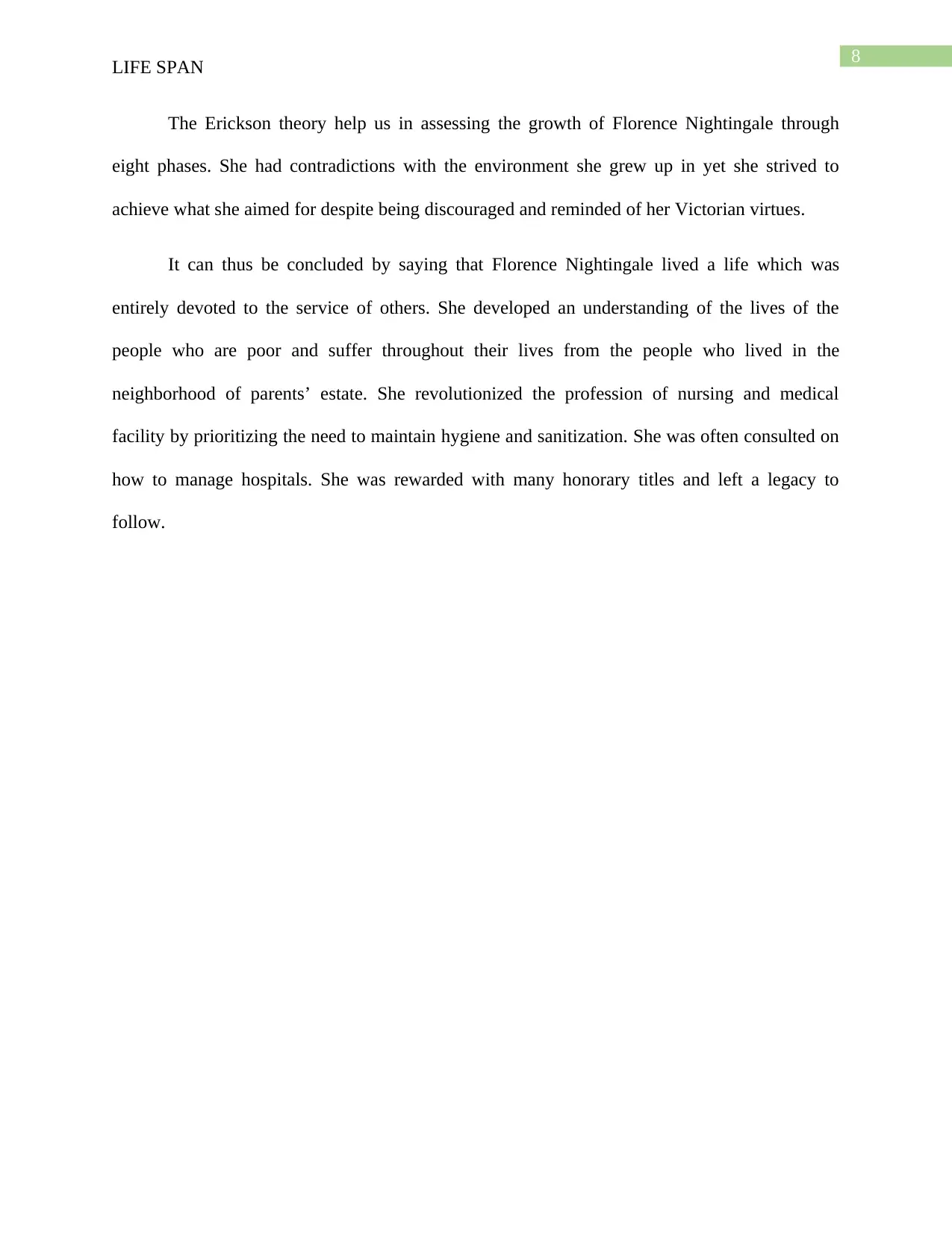
8
LIFE SPAN
The Erickson theory help us in assessing the growth of Florence Nightingale through
eight phases. She had contradictions with the environment she grew up in yet she strived to
achieve what she aimed for despite being discouraged and reminded of her Victorian virtues.
It can thus be concluded by saying that Florence Nightingale lived a life which was
entirely devoted to the service of others. She developed an understanding of the lives of the
people who are poor and suffer throughout their lives from the people who lived in the
neighborhood of parents’ estate. She revolutionized the profession of nursing and medical
facility by prioritizing the need to maintain hygiene and sanitization. She was often consulted on
how to manage hospitals. She was rewarded with many honorary titles and left a legacy to
follow.
LIFE SPAN
The Erickson theory help us in assessing the growth of Florence Nightingale through
eight phases. She had contradictions with the environment she grew up in yet she strived to
achieve what she aimed for despite being discouraged and reminded of her Victorian virtues.
It can thus be concluded by saying that Florence Nightingale lived a life which was
entirely devoted to the service of others. She developed an understanding of the lives of the
people who are poor and suffer throughout their lives from the people who lived in the
neighborhood of parents’ estate. She revolutionized the profession of nursing and medical
facility by prioritizing the need to maintain hygiene and sanitization. She was often consulted on
how to manage hospitals. She was rewarded with many honorary titles and left a legacy to
follow.
⊘ This is a preview!⊘
Do you want full access?
Subscribe today to unlock all pages.

Trusted by 1+ million students worldwide
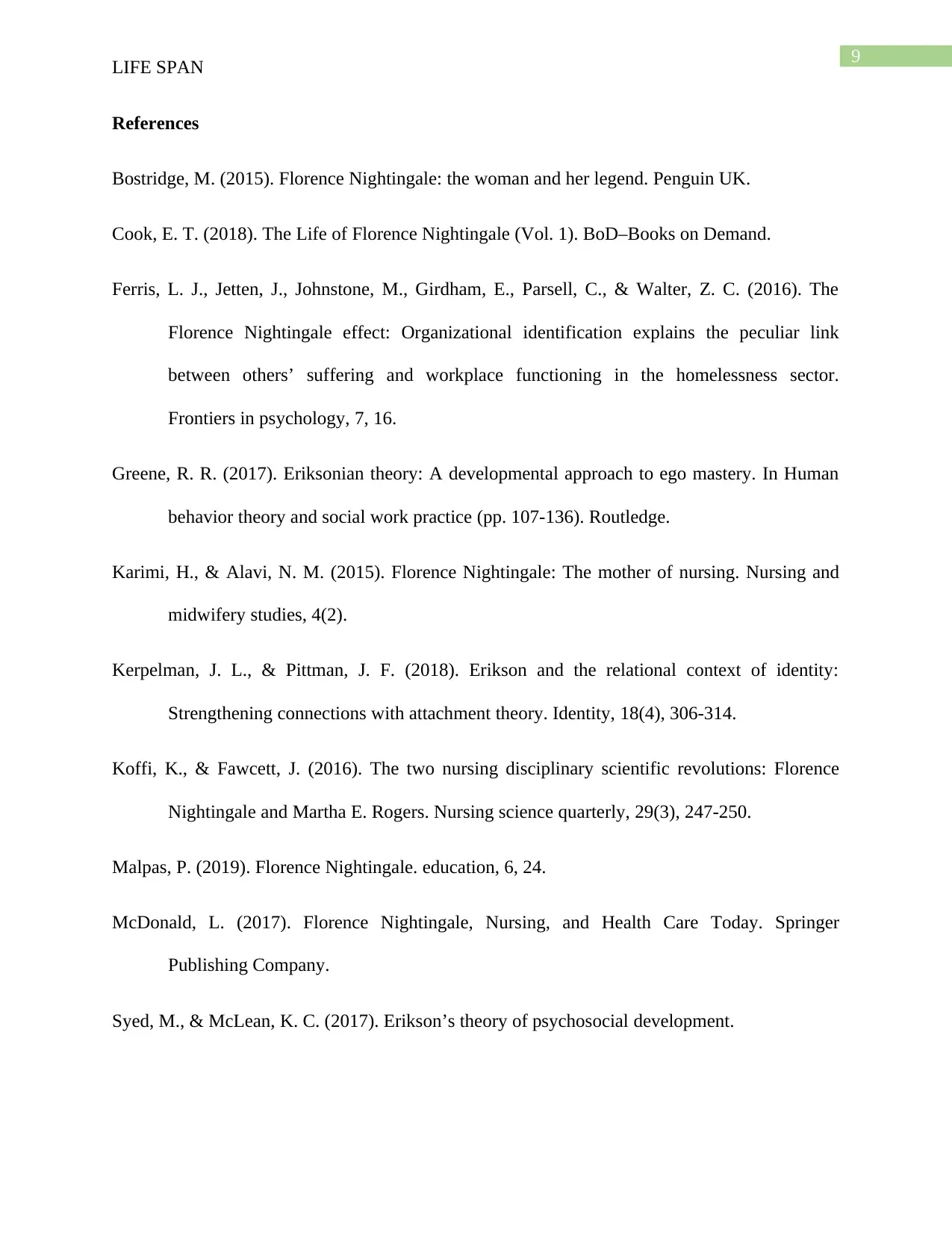
9
LIFE SPAN
References
Bostridge, M. (2015). Florence Nightingale: the woman and her legend. Penguin UK.
Cook, E. T. (2018). The Life of Florence Nightingale (Vol. 1). BoD–Books on Demand.
Ferris, L. J., Jetten, J., Johnstone, M., Girdham, E., Parsell, C., & Walter, Z. C. (2016). The
Florence Nightingale effect: Organizational identification explains the peculiar link
between others’ suffering and workplace functioning in the homelessness sector.
Frontiers in psychology, 7, 16.
Greene, R. R. (2017). Eriksonian theory: A developmental approach to ego mastery. In Human
behavior theory and social work practice (pp. 107-136). Routledge.
Karimi, H., & Alavi, N. M. (2015). Florence Nightingale: The mother of nursing. Nursing and
midwifery studies, 4(2).
Kerpelman, J. L., & Pittman, J. F. (2018). Erikson and the relational context of identity:
Strengthening connections with attachment theory. Identity, 18(4), 306-314.
Koffi, K., & Fawcett, J. (2016). The two nursing disciplinary scientific revolutions: Florence
Nightingale and Martha E. Rogers. Nursing science quarterly, 29(3), 247-250.
Malpas, P. (2019). Florence Nightingale. education, 6, 24.
McDonald, L. (2017). Florence Nightingale, Nursing, and Health Care Today. Springer
Publishing Company.
Syed, M., & McLean, K. C. (2017). Erikson’s theory of psychosocial development.
LIFE SPAN
References
Bostridge, M. (2015). Florence Nightingale: the woman and her legend. Penguin UK.
Cook, E. T. (2018). The Life of Florence Nightingale (Vol. 1). BoD–Books on Demand.
Ferris, L. J., Jetten, J., Johnstone, M., Girdham, E., Parsell, C., & Walter, Z. C. (2016). The
Florence Nightingale effect: Organizational identification explains the peculiar link
between others’ suffering and workplace functioning in the homelessness sector.
Frontiers in psychology, 7, 16.
Greene, R. R. (2017). Eriksonian theory: A developmental approach to ego mastery. In Human
behavior theory and social work practice (pp. 107-136). Routledge.
Karimi, H., & Alavi, N. M. (2015). Florence Nightingale: The mother of nursing. Nursing and
midwifery studies, 4(2).
Kerpelman, J. L., & Pittman, J. F. (2018). Erikson and the relational context of identity:
Strengthening connections with attachment theory. Identity, 18(4), 306-314.
Koffi, K., & Fawcett, J. (2016). The two nursing disciplinary scientific revolutions: Florence
Nightingale and Martha E. Rogers. Nursing science quarterly, 29(3), 247-250.
Malpas, P. (2019). Florence Nightingale. education, 6, 24.
McDonald, L. (2017). Florence Nightingale, Nursing, and Health Care Today. Springer
Publishing Company.
Syed, M., & McLean, K. C. (2017). Erikson’s theory of psychosocial development.
Paraphrase This Document
Need a fresh take? Get an instant paraphrase of this document with our AI Paraphraser
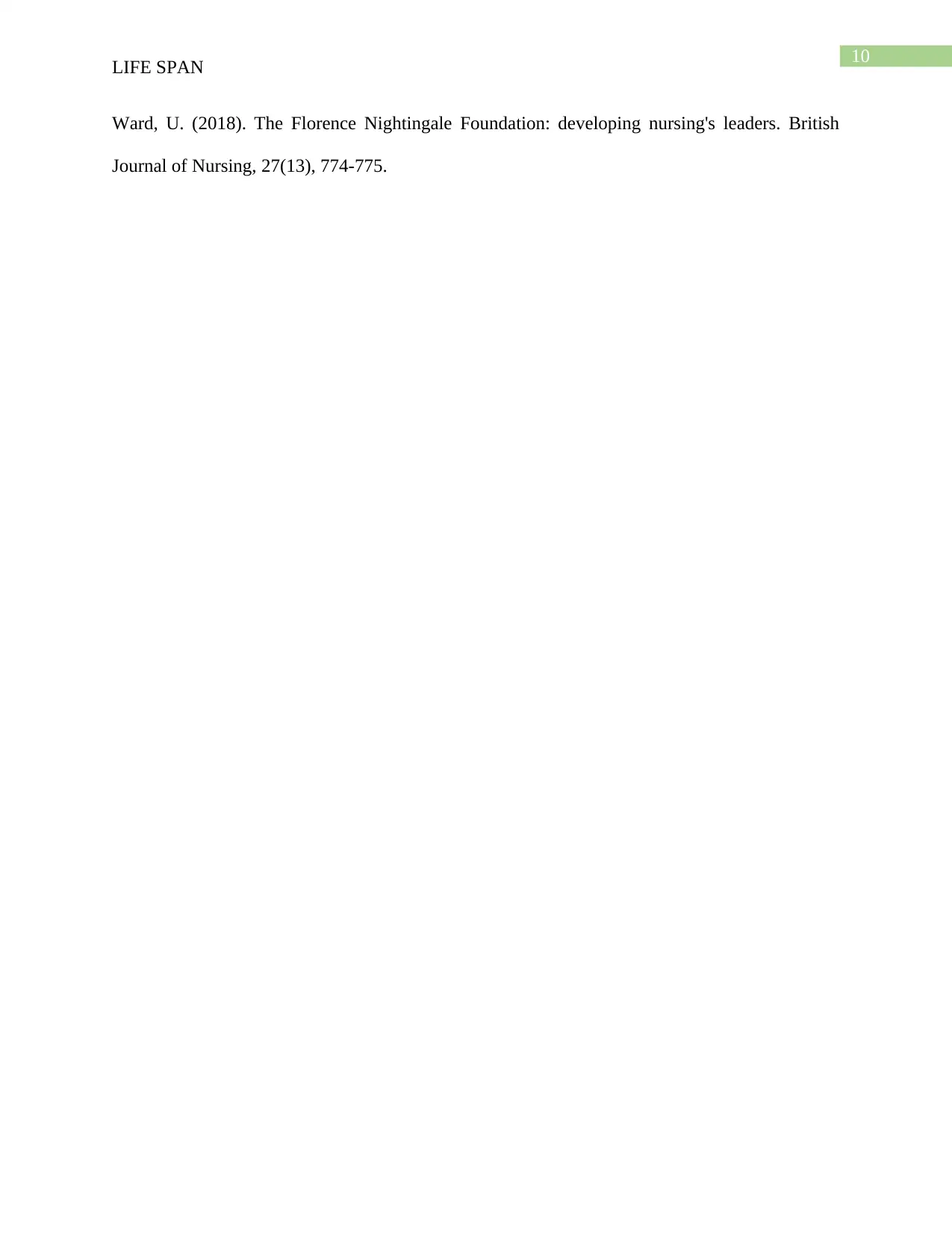
10
LIFE SPAN
Ward, U. (2018). The Florence Nightingale Foundation: developing nursing's leaders. British
Journal of Nursing, 27(13), 774-775.
LIFE SPAN
Ward, U. (2018). The Florence Nightingale Foundation: developing nursing's leaders. British
Journal of Nursing, 27(13), 774-775.
1 out of 11
Related Documents
Your All-in-One AI-Powered Toolkit for Academic Success.
+13062052269
info@desklib.com
Available 24*7 on WhatsApp / Email
![[object Object]](/_next/static/media/star-bottom.7253800d.svg)
Unlock your academic potential
Copyright © 2020–2026 A2Z Services. All Rights Reserved. Developed and managed by ZUCOL.





